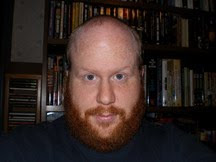First off, if you haven't seen the David Tennant version of Hamlet, you should watch it. It's available on DvD and iTunes and whatever. Tennant brings a great manic quality to Hamlet which fans of Dr. Who will be familiar with (he was the tenth Doctor). It's the first version of Hamlet I've seen where all the funny parts are actually funny! (All of Shakepeare's tragedy's have quite a lot of humor in them.)
Watching this led me to think about the structure of Hamlet. Whether you know it or not, the basic plot of Hamlet is ancient. It goes back to at least ancient Egypt and the story of Osiris. Osiris is killed by his brother Set, who is overthrown in turn by his nephew Horus (Osiris' son).
Hamlet follows this basic plot with variations. One of the biggest variations is that Hamlet dies in the end. If Hamlet is the Horus figure, killing his uncle (another variation) and avenging his father, he should become king and re-establish his father's kingdom. But he doesn't. After killing his uncle Claudius, Hamlet in turn dies. Order is re-established by a secondary figure called Fortinbras. Why does this happen and does it make sense?
Yes, it makes perfect sense. First, this is a tragedy, which means that the main character has to die. But above and beyond that, Shakespeare has created a situation where Hamlet cannot fulfill his role as a Horus figure and needs another Horus figure, Fortinbras, to do so.
Fortinbras is a Horus figure too? Yes, and here's why. The world of Hamlet is essentially two worlds. There's the smaller world of Denmark, the Danish court, and the larger world of Scandinavia. Characters in the play fulfill different, or fail to fulfill any, roll within these two worlds. For instance, within the larger world of Scandinavia, Fortinbras is Horus and Hamlet (through association with his family) is Set. In the smaller world of the Danish court, however, Hamlet is Horus and Fortinbras has essentially no role (until he enters at the end of the play).
To explain this, we need to look at the two worlds separately. First, the smaller world of the Danish court. In this world, Hamlet Sr. (Hamlet's father is also named Hamlet) is the rightful king. He's the Osiris figure. He's murdered by his brother Claudius, who then seizes the crown and becomes king. Claudius is the Set figure, the usurper. Hamlet Jr. becomes of aware of this and eventually kills Claudius, making him the Horus figure, the avenger. Another way of thinking of these character types is Rightful Ruler or King, Usurper, and Avenger.
In the world of Scandinavia, things are different. Originally, Fortinbras Sr. was the ruler of Norway and Denmark (like Hamlet, Fortinbras' father was also named Fortinbras). In this world, Fortinbras Sr. is the rightful king. He loses the throne of Denmark to Hamlet Sr., who kills him in battle. Hamlet Sr. then is the Set figure of this world, the usurper (as is his entire family, which is why Hamlet also fulfills the role of Set in this world). Fortinbras Jr. is then the Horus figure who should avenge his father, but he can't.
In the play, Fortinbras Jr. wants to invade Denmark and reclaim his father's kingdom, but he's forbidden from doing so by the King of Norway. So Fortinbras, the man of action, can't act and can't fulfill his role as Horus. Instead, his double in the smaller would, Hamlet, is forced to act. Hamlet, though, is the man of inaction. He is both Set and Horus at the same time. He both benefits from his father's usurpation and suffers from his uncle's usurpation. In the end, he chooses to become Horus the Avenger.
But even with the death of his uncle Claudius, a basic wrong still exists. Hamlet still is a Set figure in the larger world. Fortinbras still needs to reclaim his father's kingdom. So Hamlet has to die. Before he does, he passes the kingship to his double Fortinbras, who enters after Hamlet dies. Fortinbras then can fulfill his role as Horus by re-establishing his father's kingdom.
At the end of Hamlet, all wrongs are righted, all roles fulfilled. The two worlds are brought in to harmony. Shakespeare, not that this needs confirmation from me, is a complete genius. Now go watch the play.
Thursday, September 1, 2011
Thursday, June 16, 2011
I'd like to draw attention to my friend Mike's website: www.michaelpoore.net
Mike has a book coming out next year, a real book (called Up Jumps the Devil) by a real publisher (Ecco/HaperCollins). He's also posting a great blog which is definitely worth reading.
Go there, now!
Sunday, April 10, 2011
Hiatus Over
I'm just posting to let all my loyal readers (all one of them, assuming he still reads this) that I'm still alive and will start updating this blog again. It's been a hard winter in more ways than one. Now that it's lightened up (both literary and metaphorically), I can blog again.
Subscribe to:
Comments (Atom)
